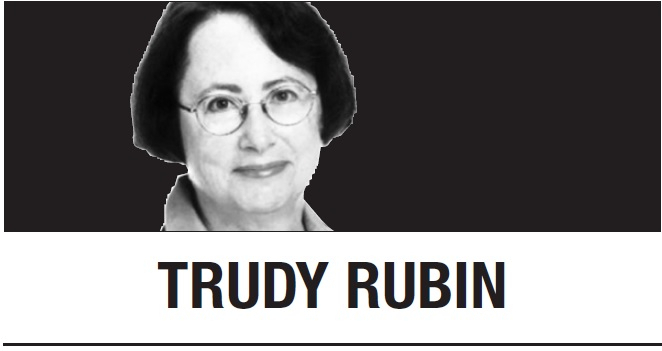
There are moments, during horrific natural disasters such as the earthquake in Turkey and Syria, when you can witness the best that mankind is capable of -- the noble behavior that often emerges during a crisis.
A Greek search and rescue team and Turkish special operations police -- whose members might have been fighting each other in wartime -- worked side by side to rescue a small girl through a narrow gap in a pile of concrete that once was an apartment building near Antakya, Turkey. A group of Syrian White Helmets, scores of whom died rescuing civilians in Aleppo from the massive Syrian government bombings during the civil war, returned to extract a bloodied toddler from earthquake rubble in Azaz.
The endless Twitter videos of dramatic rescues move me to tears. But then anger sets in.
While an earthquake is an act of nature, it's not too soon to ask what contribution three political leaders have made to the extent of the disaster. When it comes to Turkish President Recep Tayyip Erdogan, Syrian dictator Bashar al-Assad and Vladimir Putin, that contribution is enormous. Untold numbers of earthquake victims will die unnecessarily because of what these three have done -- or refused to do.
As the earthquake death toll mounts, longtime Turkish journalist and Washington Post columnist Asli Aydintasbas contends that Turkey's earthquake may be more than just a natural disaster.
After a massive earthquake in 1999, she writes, the blame for many deaths "went to contractors who used cheap materials, officials who failed to enforce Turkey's relatively loose building codes," and "to a government that has failed to develop a nationwide earthquake response strategy."
Erdogan's Justice and Development Party, known as AKP, rode to power shortly afterward, as the public demanded change. But over the past decade, the Turkish president has become increasingly autocratic, arresting opposition leaders and journalists and cracking down on any criticism. Corruption has flourished; Turkey has slid steadily downhill on Transparency International's annual, respected Corruption Perceptions Index, sinking to 38 on a scale of 0-100, where 0 means highly corrupt and 100 means very clean.
Erdogan has favored friendly magnates from Turkey's booming construction industry and disdained urban planners and environmentalists. Rules for earthquake-safe construction, finally passed in 2018, are ignored, with scant oversight.
Aided by Erdogan's blind eye, corrupt builders using shoddy materials likely doomed Turkish citizens across the earthquake zone.
Also disturbing, many of the worst-hit parts of Turkey are located in ethnic Kurdish areas of the country, whose cities and towns have been repressed by Erdogan's government. Death tolls are rising there amid freezing temperatures. The United Nations, along with international aid groups, must insist that Erdogan does not shortchange Kurdish areas that desperately need aid.
Meantime, across the border in Syria, the brutal Assad is directly responsible not only for much of the current Syrian death toll but also for the inability of international rescue teams to access the quake zone.
During Syria's civil war, in which disaffected Syrians tried to overthrow the dictator, Assad's planes bombed opposition towns mercilessly, aided by the Russian air force of his ally, Vladimir Putin. Hospitals, schools and markets were targets of the Assad-Putin massacres from the air.
Millions of refugees from the bombings flooded into the cities and towns of northern Syria, which are now being hit hardest by the earthquake and have almost no access to aid.
Since this northern region of Idlib is considered opposition territory by Assad, he managed, years ago, to limit the amount of humanitarian refugee aid that could be sent across the border from neighboring Turkey or Iraq. When the United Nations tried to get Assad to permit more aid to flow in, Russia vetoed the attempt at the UN Security Council. (Hats off again to Putin for helping ensure that more civilians die.)
Prior to the earthquake, Assad permitted aid to enter via only one border crossing terminal from Turkey, called Bab al-Hawa. Now that terminal has been destroyed by the earthquake.
So, as Syrian survivors in Idlib wander aimlessly in the snow, their flimsy housing destroyed, and as White Helmets desperately attempt rescue, there is no international aid -- no medicine, no food, and no help for the millions of desperate Syrians affected. International aid agencies have no way to reach them unless Assad opens more crossings.
That is just fine for the Syrian dictator. The more opposition supporters who die, the better chance he has to retake Idlib province in the north.
Can Erdogan and Assad be made to pay for their contribution to earthquake deaths?
Turkey is scheduled to hold a general election in June. Erdogan has jailed the most popular opposition leader, Istanbul Mayor Ekrem Imamoglu. But the president's contribution to this disaster might increase popular support for the remaining opposition leaders and further diminish Erdogan's onetime popularity with religious Kurds.
As for Assad, the test will be whether the United Nations can press him to permit aid to cross into Syria -- and what he and Putin will demand as a price for this "humanitarian gesture." Erdogan will have an important role to play in urging Putin to agree.
Meantime, as earthquake casualties mount into the high thousands, one thing can be said for certain: Erdogan, Assad and Putin are responsible for many of those deaths.
Trudy Rubin
Trudy Rubin is a columnist and editorial-board member for the The Philadelphia Inquirer. -- Ed.
(Tribune Content Agency)



![[Herald Interview] 'Trump will use tariffs as first line of defense for American manufacturing'](http://res.heraldm.com/phpwas/restmb_idxmake.php?idx=644&simg=/content/image/2024/11/26/20241126050017_0.jpg)

![[Health and care] Getting cancer young: Why cancer isn’t just an older person’s battle](http://res.heraldm.com/phpwas/restmb_idxmake.php?idx=644&simg=/content/image/2024/11/26/20241126050043_0.jpg)

